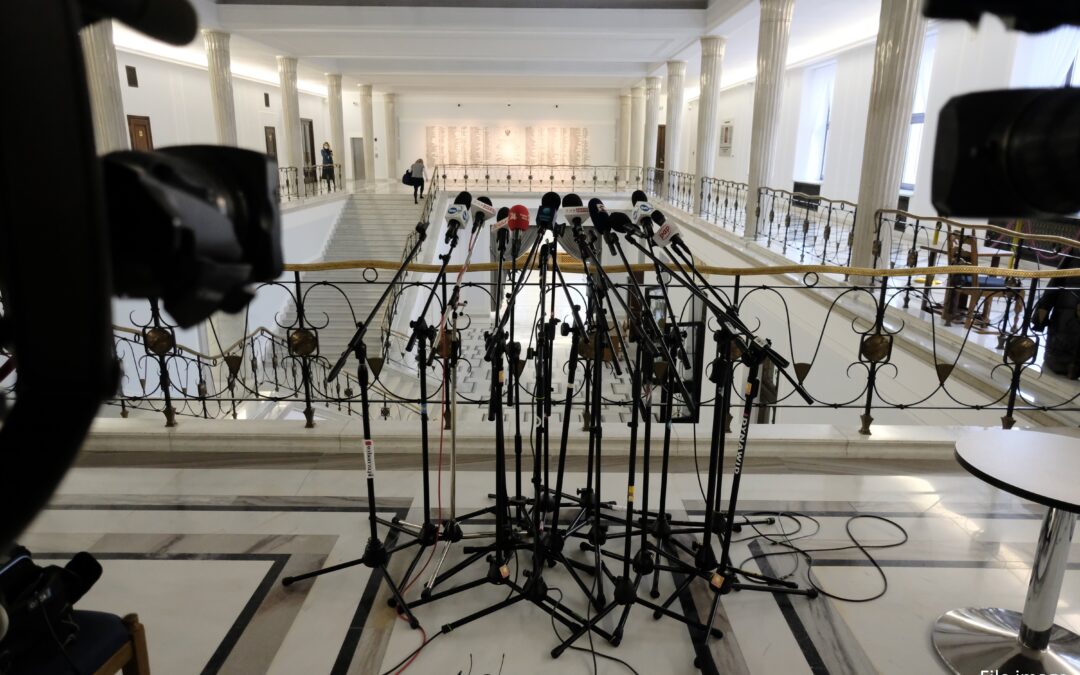Journalists working in Poland’s parliament today boycotted a press conference organised by the far-right Confederation (Konfederacja) party, at which its MPs complained that Ukrainian refugees are being given a “privileged” status in Poland.
Last week, when parliament approved a new law providing support to the huge numbers of Ukrainians who have fled to Poland, Confederation was the only party to vote against it. It has also in the past campaigned against earlier mass migration of Ukrainians to Poland.
Today, Confederation announced that it would hold a press conference in parliament to discuss the refugee crisis under the slogan “Yes to help, no to privileges”. One of its leaders, Krzysztof Bosak, said ahead of the event that “the overzealousness of the government [in helping refugees] is creating a sense of injustice”.
Dziś o 11:30 w Sejmie konferencja prasowa @KONFEDERACJA_ ws. uchodźców: „Tak dla pomocy, nie dla przywilejów”.
Nadgorliwość rządu i niektórych instytucji powoduje poczucie niesprawiedliwości. Nie tylko u Polaków, ale i Ukraińców którzy przybyli wcześniej. Potrzeba roztropności!
— Krzysztof Bosak 🇵🇱 (@krzysztofbosak) March 17, 2022
However, when the press conference began, the two Confederation MPs present – Grzegorz Braun and Michał Urbaniak – found that journalists who normally report from parliament had turned their cameras and microphones off and gone to sit at a nearby table, ignoring the event.
“Journalists were outraged by the topic of the conference,” wrote Łukasz Szpyrka of news website Interia. “The Confederation MPs spoke to themselves and their party’s camera for 19 minutes. Their faces were unlit because the media did not turn on the lights.”
Klaudiusz Slezak, a journalist from Radio Nowy Świat, posted a photo of the press conference with the boycotting journalists seated nearby.
Na słynnej już konferencji nie ma żadnych dziennikarzy. Część operatorów kamer też odmówiła nagrywania. @RadioNowySwiat pic.twitter.com/AT7sCvPMxi
— Klaudiusz Slezak 🚴♂️ (@KlaudiuszSlezak) March 17, 2022
Jan Strzeżek, an MP from the centre-right Agreement (Porozumienie) party, expressed support for the journalists’ actions, tweeting a series of applause emojis while reporting on the boycott.
Many leading journalists from across the political spectrum also praised their colleagues’ actions, including Agnieszka Gozdyra of Polsat News and Sylwia Czubkowska, managing editor of the Spider’s Web technology website, who called the boycott “beautiful” and “good new journalistic standards”.
Albo mi się zdaje, albo dziennikarze w Sejmie zbojkotowali konferencje Konfederacji 👏🏻👏🏻👏🏻
— Jan Strzeżek (@JanStrzezek) March 17, 2022
Piotr Filipczyk, writing for Catholic magazine Niedziela, likewise argued that the boycott was a “legitimate gesture of opposition to a group whose leaders have presented pro-Russian sympathies, thus undermining the Polish national interest”.
However, Łukasz Warzecha, a right-wing libertarian commentator, accused the boycotting journalists of “censorship, motivatived by some infantile emotions”.
A tak serio, to się robi autentycznie niebezpieczne. Mamy do czynienia z faktyczną cenzurą, motywowaną jakimiś infantylnymi uniesieniami i emocjami. PiS chwalił się latami, że u nas jest wolność słowa, bo można mówić o problemach migracyjnych na Zachodzie. Jak widać, są granice. https://t.co/1m6nLBBRS2
— Łukasz Warzecha (@lkwarzecha) March 17, 2022
During the conference, the far-right MPs gave examples of what they claimed are the privileges granted to Ukrainians, such as being given free travel on public transport while other passengers are facing ever-higher ticket costs, reports Press magazine.
“Poland does not receive financial support [for taking in refugees] like Turkey did,” said Tomasz Grabarczyk, Confederation’s press secretary. “Benefits for refugees will be at the expense of the taxpayer. If we continue the policy of giving away, we will accelerate our path into the abyss.”
Since Russia’s invasion, almost two million people have fled from Ukraine into Poland. In response, the Polish government, local authorities, NGOs, businesses, religious groups and individual Poles have launched an unprecedented effort to provide aid and other forms of support to the refugees.
The population of Warsaw has risen 17% due to the arrival of 300,000 refugees from Ukraine
President Duda yesterday "appealed to the entire international community" for help with the refugee crisis. Otherwise "we will be in a very difficult situation" https://t.co/9JBDNfAoBv
— Notes from Poland 🇵🇱 (@notesfrompoland) March 17, 2022
Main image credit: Slawomir Kaminski / Agencja Wyborcza.pl

Daniel Tilles is editor-in-chief of Notes from Poland. He has written on Polish affairs for a wide range of publications, including Foreign Policy, POLITICO Europe, EUobserver and Dziennik Gazeta Prawna.




















